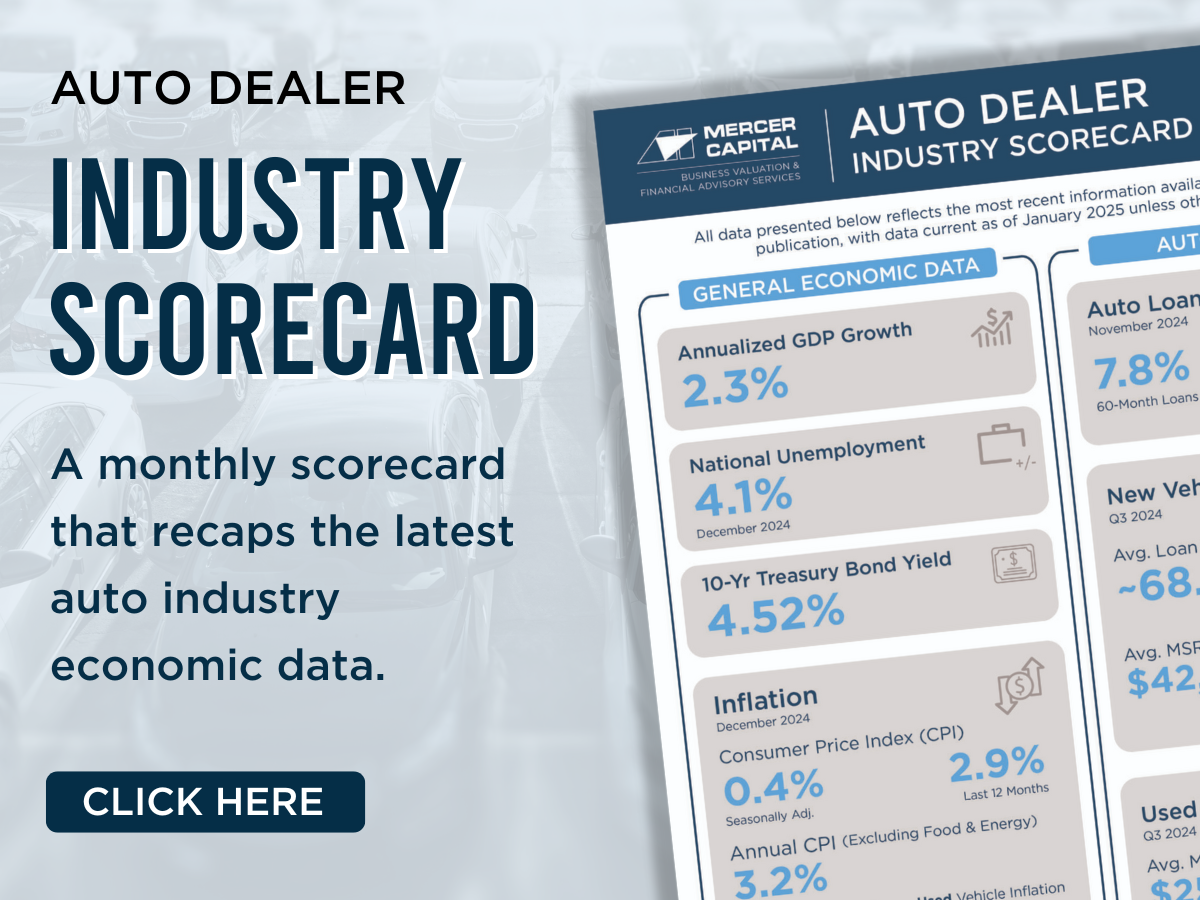January 2021 SAAR (a measure of Light-Weight Vehicle Sales: Auto and Light Trucks) increased to 16.6 million from 16.2 million in December. Though this is a decline of 1.4% from the same period last year, this is the highest that SAAR has been since the pandemic began. Light truck sales were behind this growth, as they captured 77.8% of all new vehicles sold in the past month. Despite January’s peak, two significant events could hinder February’s outcome.
Blog
Auto Dealer Valuation Insights
Regular updates on issues important to the Auto Dealer industry
Seven Factors of a Highly Effective Buy-Sell Agreement for Auto Dealerships
A Roadmap to the Valuation Process
In this post, we will cover seven factors of a highly effective buy-sell agreement for auto dealerships and also touch on several other considerations.
Public Auto Dealer Profiles: Lithia Motors
This post is the first of a series where we profile the six public new vehicle dealerships; our goal is to provide a reference point for private dealers. Dealers may benefit in benchmarking to public players, particularly those that are significantly larger with numerous rooftops. Smaller or single point franchises will find better peers in the average information reported by NADA in their dealership financial profiles. Public auto dealers also provide insight as to how the market prices their earnings. This week, we start with Lithia Motors (LAD).
The Chip Shortage Is Making It Feel Like 2020 All Over Again
In this blog post, we will discuss the necessity of chips in the auto making process, how the chip shortage came into fruition, how it is affecting the industry, and what all this might mean for auto dealers going forward.
Changing Advertising Trends for Sunday’s Big Game
How the Auto Industry Is Spending Advertising Dollars
So it’s the week of the big game. What are you most looking forward to? The game? The food – appetizers and snacks? The halftime show? Or maybe the commercials? Inevitably, all of us probably have this same list of things in some particular order. The festivities will probably look entirely different this year with smaller gatherings and pandemic protocols affecting travel and public viewing at restaurants and sports bars. But what will this year’s commercial line up look like and will the auto industry participate? Will this year serve to be an aberration or is it a reflection of advertising changes impacting the auto industry and auto dealerships?
Headwinds and Tailwinds for Auto Dealers
Your Flight Itinerary for 2021
If you’ve ever been on a flight, you know that the pilot and plane itself can only do so much in determining how quickly you get to your destination. A key factor is which way the wind is blowing. If the pilot announces that there are headwinds, you can expect your flight time to be on the longer side. The opposite is true with tailwinds, and you can expect to arrive at your destination more quickly under these circumstances.
Similarly for auto dealers, sometimes it doesn’t matter what the dealership’s management is like or how good the dealership itself is, as certain headwinds and tailwinds can make it harder or easier to achieve its goals. In this post, we have considered some headwinds and tailwinds heading into 2021.
December 2020 SAAR
2021 Predictions for Auto Dealers
Heading into 2021, we’re going to make some SAAR predictions. Although they may or may not prove true in 2021, we believe this exercise is beneficial for auto dealers who should be looking forward to what the year might bring and prepare themselves should these trends materialize.
Valuation Considerations for Auto Dealership Entities with Multiple Franchises
The valuation of an auto dealership can be a challenging and complicated process. The structure of most auto dealerships consists of an entity holding the actual dealership operations and a separate entity owning the real estate and building. Often the latter is a related party entity that charges the dealership rent for use of the land and building. Occasionally, the real estate and the dealership operations are contained in the same entity.
We are all used to the local dealership in our town: Bill Jones Honda, Steve Smith Chevrolet. But what about the larger auto groups that have multiple franchises organized in the same entity? How are they valued and what special valuation considerations apply to them?
2021 New Year’s Resolutions for Auto Dealers
At the start of a new year, many people, including myself, try to establish resolutions to get the year started off on the right foot. This is especially prevalent this year with most people welcoming 2021 with open arms after the disaster of a year that was 2020. When considering the auto industry in 2020 and predictions for 2021, making some “resolutions” for your dealership to prepare for the year ahead could prove to be helpful. With that being said, here are a few common “New Year’s Resolutions” that can be applied to your auto dealership.
Weather Report for Auto Dealers
Q3 Climate for Blue Sky Multiples, Transaction Activity, and Other Trends
In the last few weeks, Haig Partners and Kerrigan Advisors have released their Third Quarter Blue Sky Reports and J.D. Power just released its U.S. Sales Satisfaction Index. We find these reports to be timely and informative of not only where the auto dealer industry is today, but where it is headed. Through observing all of these different sources, we can achieve a well-rounded understanding of the climate surrounding the auto dealership industry. In this post, we look at a few of the trends and key takeaways discussed in these reports.










